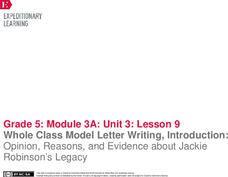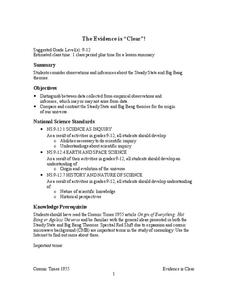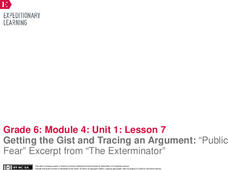EngageNY
Whole Class Model Letter Writing, Introduction: Opinion, Reasons, and Evidence about Jackie Robinson’s Legacy
Sharing is caring! Using the collaborative lesson, scholars engage in a shared writing process with the teacher. Working together, they compose opinion letters about Jackie Robinson's legacy.
ReadWriteThink
Persuasive Essay: Environmental Issues
Young environmentalists learn how to craft a persuasive essay about an environmental issue they consider important. After studying the components of a persuasive essay and examining a student model, writers brainstorm possible topics and...
Curated OER
Create a Walking Tour of San Francisco's Chinatown
Take a tour of Chinatown as it was in the 1800's. Analyzing primary source images and documents, learners will gain a better understanding of the myths and misconceptions of Chinese immigrants during the 1800's. They create a pamphlet to...
Curated OER
Do Presidential Candidates Need to Be Good Debaters?
Blogs can be a good way for learners to engage in writing, critical thinking, and social media in a formal way. The New York Times has provided learners age 13-18 with an article, background information, and several prompts to get them...
Ed Helper Clip Art
Main Idea Three Ideas and Details
Readers organize and display three ideas that support a topic, as well as two details that support each idea.
Trinity University
Explain Yourself: An Expository Writing Unit for High School
Introduce expository writing with a unit that asks writers to craft an essay to explain a belief, value, or priority that is important to them. Mini-lessons within the unit focus on crafting thesis statements and conclusions, selecting...
Curated OER
Literary Mood Ring
Get some giggles from your class and build understanding of the mood of a literary piece with this printable. Pupils fill in the mood in the gem part of the ring, and write down supporting details below (inside of the actual ring). While...
Annenberg Foundation
Evaluating Evidence
Was the Civil War fought only due to slavery? Using an interactive web tool, scholars investigate the four main causes of the Civil War. Gathering evidence and data to support their claims, they present a final statistical breakdown...
Howard Hughes Medical Institute
Developing an Explanation for Mouse Fur Color
Whether or not you think mice are nice, you'll love the colorful activity! Scholars examine evidence for evolution in the rock pocket mouse through video, discussion, and collaborative work. Learners watch a video regarding variation in...
EngageNY
Mid-Unit 3 Assessment, Part II: Organizing Notes for a Public Speech
It's all a matter of opinion! Pupils take Part II of the mid-unit assessment, in which they continue organizing their notes in preparation for writing an opinion speech. Using the resource, they add reasons, evidence, and a concluding...
University of North Carolina
Statistics
Let's see you back it up! As shown in the 18th handout in the Writing the Paper series of 24 lessons from UNC, statistics help form an effective argument. The handout discusses how to analyze a source and break down the data to ensure it...
Polk Bros Foundation
Answer the BIG Question with Cited Examples and Evidence
Close up your unit of study with an examination of one of the guiding or essential questions as it relates to what your class has studied and other research. Class members first write down the question. Then they note down information...
Michigan Association of Intermediate School Administrators
Persuasive Essay: Grade 5
Improve your fifth graders' persuasive writing skills in four weeks. Working independently, in peer editing groups, and with instruction, writers work over the 17 sessions to craft an argumentative essay. They craft a...
Curated OER
Let's Get it Together! Reading to Learn
Let’s learn about frogs! Young readers are led through “Freaky Frogs,” a non-fiction article. Teach learners how to edit an article so there are fewer details to sift through. After talking through the article, they learn the six steps...
NASA
The Evidence is “Clear”!
Do you think you know better? Become a scientist and prove it. Scholars review the evidence for two different theories of the origins of the universe. They notice the empirical observations as well as the inferences to determine which is...
EngageNY
Establishing Structures for Reading: Gathering Evidence about Salva’s and Nya’s Points of View (Reread Chapters 1 and 2)
Readers practice gathering textual evidence to support their understanding of character point of view in A Long Walk to Water by Linda Sue Park. Working with partners, they complete a Gathering Evidence graphic organizer and engage in...
Literacy Design Collaborative
Using Textual Evidence to Analyze Literary Responses to Historical Events
Scholars analyze Animal Farm to learn how to add textual evidence into essays to support their ideas. They search for a deeper meaning to the story and how it relates to the text Totalitarianism and Revolutions in Russia. To finish,...
EngageNY
Central Idea and Supporting Details: “Equal Rights for Women”
It's my right, not a privilege! Scholars review the details of the claims in the speech "Equal Rights for Women." They meet with one of their discussion appointments from a previous instructional activity to locate evidence to support...
Student Handouts
Four-Square Writing Method
Pupils produce paragraphs with planning and precision with the four-square writing method, which allows learners to organize the topic, supporting, and summary sentences of their paragraphs.
EngageNY
Forming Evidence-Based Claims: Should Lyddie Sign the Petition?
Pupils reread selected passages from Katherine Paterson's novel Lyddie. After they finish, individuals gather textual evidence supporting whether Lyddie should sign a controversial petition and record their findings on graphic...
EngageNY
Mid-Unit 2 Assessment: On-Demand Informational Writing
Lesson 7 focuses on building academic vocabulary and writing an explanatory letter with supported textual evidence. For the first five minutes of the lesson, the educator reminds the class of how to read and refer to the accordion...
EngageNY
Getting the Gist and Tracing an Argument: “Public Fear” Excerpt from “The Exterminator”
Only fear fear itself. Scholars read Public Fear from The Exterminator. Triads work together to annotate and determine the gist of the text. They then complete a Tracing an Argument graphic organizer to identify arguments, claims,...
C3 Teachers
African Americans and the Civil War: How Did African Americans Experience the Civil War?
To understand African Americans' involvement in the United States Civil War, high schoolers gather evidence from primary source images, census reports, and documents. As a summative performance task, individuals craft an argument,...
Simon & Schuster
Classroom Activities for Ethan Frome by Edith Wharton
Edith Wharton's Ethan Frome is the focus of an 11-page packet that includes three lesson plans, three worksheets, and a homework assignment. The first lesson introduces readers to the historical context of the novel. At the same time,...

























